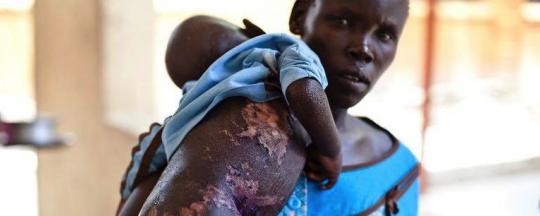Road closures, destruction of markets, killings of traders and mass population displacement away from fields and livestock have increased the chances of a famine in parts of South Sudan.
A food security organization warned on Friday that populations in some pockets of the country are already deeply affected by the nearly five months of violence.
“Without urgent action, populations in localized areas could face famine,” stated Famine Early Warning Systems network (FEWS-NET), a food security organization backed by the US Agency for International Development (USAID).
FEWS-NET mentioned areas in Unity and Upper Nile states as particularly vulnerable, explaining, “Markets are destroyed and have not resumed operations in several areas of central and north-central South Sudan since outbreak of conflict in December and January.”
The organization said there was a ‘severe’ food shortage in Malakal, the state capital of Upper Nile, noting that the river access to the town from the south has been ‘heavily disrupted.’
Also roads between Rumbek and Bentiu and between Ethiopian border areas and Nasser and Malakal have been cut.
In northern Unity state, where about a third to half of the state population is displaced, the economy has completely collapsed. Oil fields are shut down, markets are destroyed, and many cattle herds have been raided.
Even before the massacre of traders in Bentiu in mid-April, market activity at the key northern town was less than 50 percent of pre-crisis levels, according to FEWS-Net. Markets there had only recently reopened when the town was overrun by rebel fighters in mid-April.
FEWS-NET also explained that it expects some areas to remain cut off from market access owing to oncoming rains and insecurity.
However, food remains readily available at stable prices in other areas of the country, particularly in western and southern South Sudan.
“In Wau and Juba, maize supplies are available from Uganda and prices remain stable. Grain imports from Sudan and ample availability of relief commodities contributed to food availability and stable prices in Aweil,” noted the organization.
Markets in such areas could see ‘moderate’ price increases over the lean season, but prices at these ‘unaffected’ markets are not expected to exceed 2012 levels.
Photo: A woman holds her severely malnourished baby in the malnutrition ward of the Al Sabah Children’s Hospital in Juba on March 14, 2014 (AFP Photo/Ivan Lieman)
Related coverage:
South Sudan famine threat severest in three states (10 Apr.)




